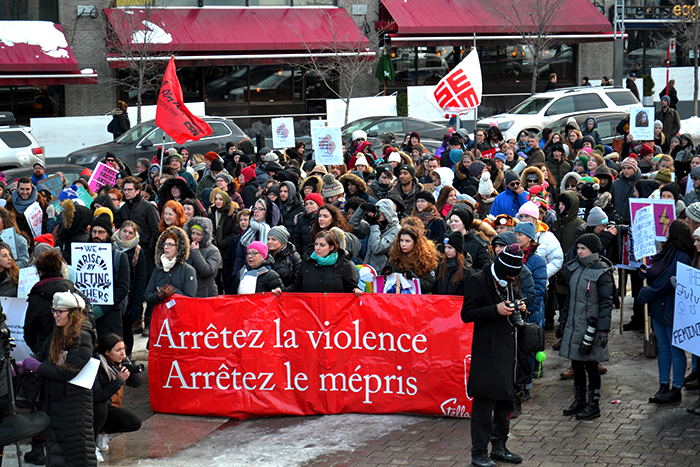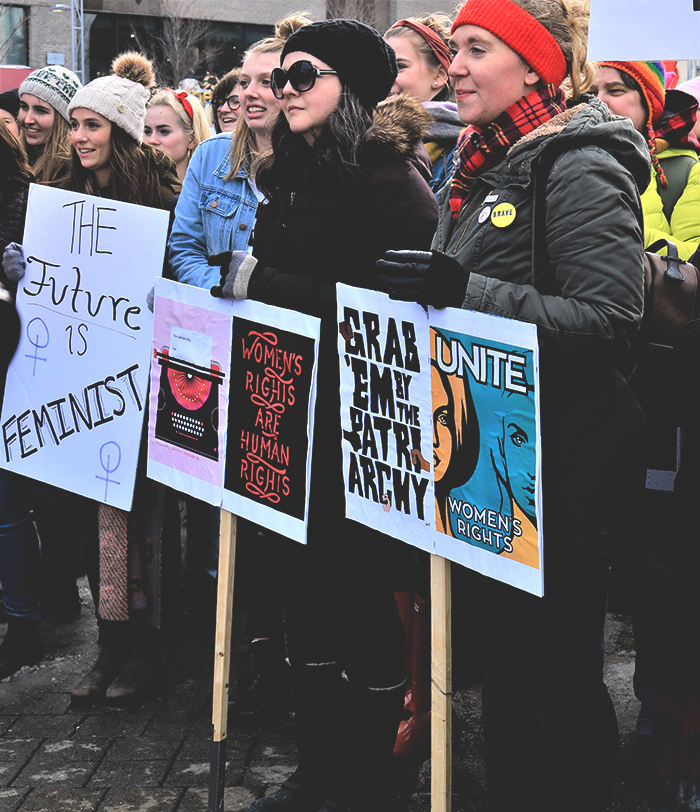On Jan. 20, the Manif des Femmes Montréal, or Women’s March on Montreal, returned to Place-des-Arts for the first anniversary of 2017’s international Women’s March. Organized by leaders of the Centre des Femmes de l’UQÀM, Stella, and Black Lives Matter, the rally called for increasing representation and inclusivity in nonviolent activist movements. Donning pink knit pussy hats and wielding hand-made posters, hundreds of people participated in the rally.
Last year, Montreal’s Women’s March was organized in solidarity with the Women’s March on Washington in response to the election and inauguration of United States President Donald Trump. This year however, the Montreal march focused less on American politics and more broadly on intersectionality and the fight for the rights of women of all races, political perspectives, sexual orientations, and gender identities globally.
Sandra Wesley, an organizer and executive director of sex worker rights group Stella, strove for the march to be inclusive for those who typically feel marginalized and excluded from political activism, including sex workers, immigrants, and transgender individuals.
“Last year, the march was tied to the inauguration of Donald Trump, which overshadowed the demands of women and clouded the scene with anger rather than progression,” Wesley said. “This year, the rally was less tied to specific events than it was shedding light on sexism, discrimination, and violence that will not be tolerated any longer.”
During the rally, leaders of the three organizer groups gave speeches. Barbara Chin, a feminist performer, also spoke, sharing statistics about the marginalization and sexualization of women, and asking the crowd to join hands as she applauded the historical resilience of women.
“As a community, as we are here for each other, for ourselves and for the world,” Chin said. “As women, we are made to believe that we are second class citizens [….] We are not respected, therefore we are exploited.”
The rise of the #MeToo movement this past year gave prominence to conversations surrounding sexual violence at the march. Protesters also referenced newer hashtags such as #thisisnolongertolerated and #timetoact to promote political involvement.
For activist Elise Van Leer, U1 Science, who attended the Women’s March on Washington last year, the focus on #MeToo and hashtag activism made this year’s march in Montreal stand out.
“I think the 20th of January will always be significant for me since attending the march in my hometown, D.C., last year,” Van Leer said. “The rally on Saturday, while much smaller, was a really eye-opening experience because you could really feel the energy and passion of the speakers. It almost felt less commercialized and more authentic. It was really meaningful to have the emphasis on intersectionality and the ‘#MeToo’ movement and you could tell everyone there really wanted to be there. I felt empowered in a way I hadn’t before within the city.”









